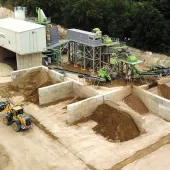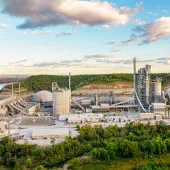First circular economy project for Hive Aggregates

UK-based company aiming to turn millions of tonnes of PFA into sustainable cement alternative
UK-based Hive Aggregates have launched their first circular economy project to create a sustainable cement alternative, saving millions of tonnes of carbon.
The Retford Circular Economy Project, located close to Retford, in Nottinghamshire, aims to carefully extract pulverized fuel ash (PFA) waste from a former landfill and process it using innovative technology to produce a sustainable cement alternative.
The project has been brought forward by Hive Aggregates, part of the Hive Energy Group, focusing on addressing decarbonization and sustainability challenges in the building products industry.
The global building products industry is resource and carbon intensive. It is estimated that if the cement industry alone were a country, it would be the third-largest carbon emitter in the world, behind only China and the US.
Hive Aggregates believe that part of the solution is to use industrial by-products and waste to create sustainable building products that reduce the need for carbon-intensive practices, such as the production of traditional cement.
PFA is a by-product from the burning of coal in power stations, large quantities of which have historically been deposited in landfill. Due to the qualities of the ash, it can be incorporated sustainably into a range of building products, including as a cement substitute.
When used as a substitute for traditional cement, PFA can save close to 1kg of carbon dioxide (CO2) for every tonne used. This is because cement production is energy and carbon intensive, requiring the raw ingredients to be kilned at upwards of 1,500C, whereas PFA has already been through a thermal process.
The Retford Circular Economy Project will supply a continued source of PFA for the UK supply chain – extracting up to 6.7 million tonnes of material to be used as a sustainable building product. This will help to the UK Government to achieve its climate targets, whilst protecting parts of the economy reliant on sustainable building products.
The project will improve local biodiversity through new habitat provision, create 20 full-time jobs, reduce the consumption of natural resources by recycling waste materials, as well as saving up to 5.3 million tonnes of carbon – more than all the CO2 produced by cars in Scotland and Wales.
Hive Aggregates have already undertaken numerous environmental impact assessments for the project, including studies on local ecology, noise, transport, air quality, and landscape and visual. In addition to the environmental assessments, the team is also carrying out a significant and meaningful community consultation exercise.
The project benefits from an Innovate UK grant to use innovative drying technology for the reclamation of PFA from the site in Nottinghamshire. The grant is in partnership with Coomtech, the technology provider, and Aggregate Industries. The grant from BEIS, managed by Innovate UK, is part of support funding for major industries to meet the UK’s net-zero targets.
Jake Barnes-Gott, director of Hive Aggregates, commented: ‘The project is exactly the sort of thing we need to be doing to reduce carbon emissions. The beauty of the project is that these carbon savings will come from recycling a waste by-product from coal-fired power stations.
‘We see this project as a way to release carbon savings locked away in the ground using innovative technology, not to mention that it will reduce the need to mine natural resources. We are very excited.’
Giles Redpath, chief executive officer of Hive Energy, added: ‘Hive Energy have been providing renewable energy solutions for over a decade now. As well as clean energy, the Hive Group is now expanding into substantial circular economy investments.
‘This is the first project for Hive Aggregates, and it has never been so important to establish sustainable alternative to carbon-intensive practices. We hope that Hive Aggregates will pave the way for pulverized fly ash in the UK, and we have the ambition to continue this fantastic development on a global scale.’









